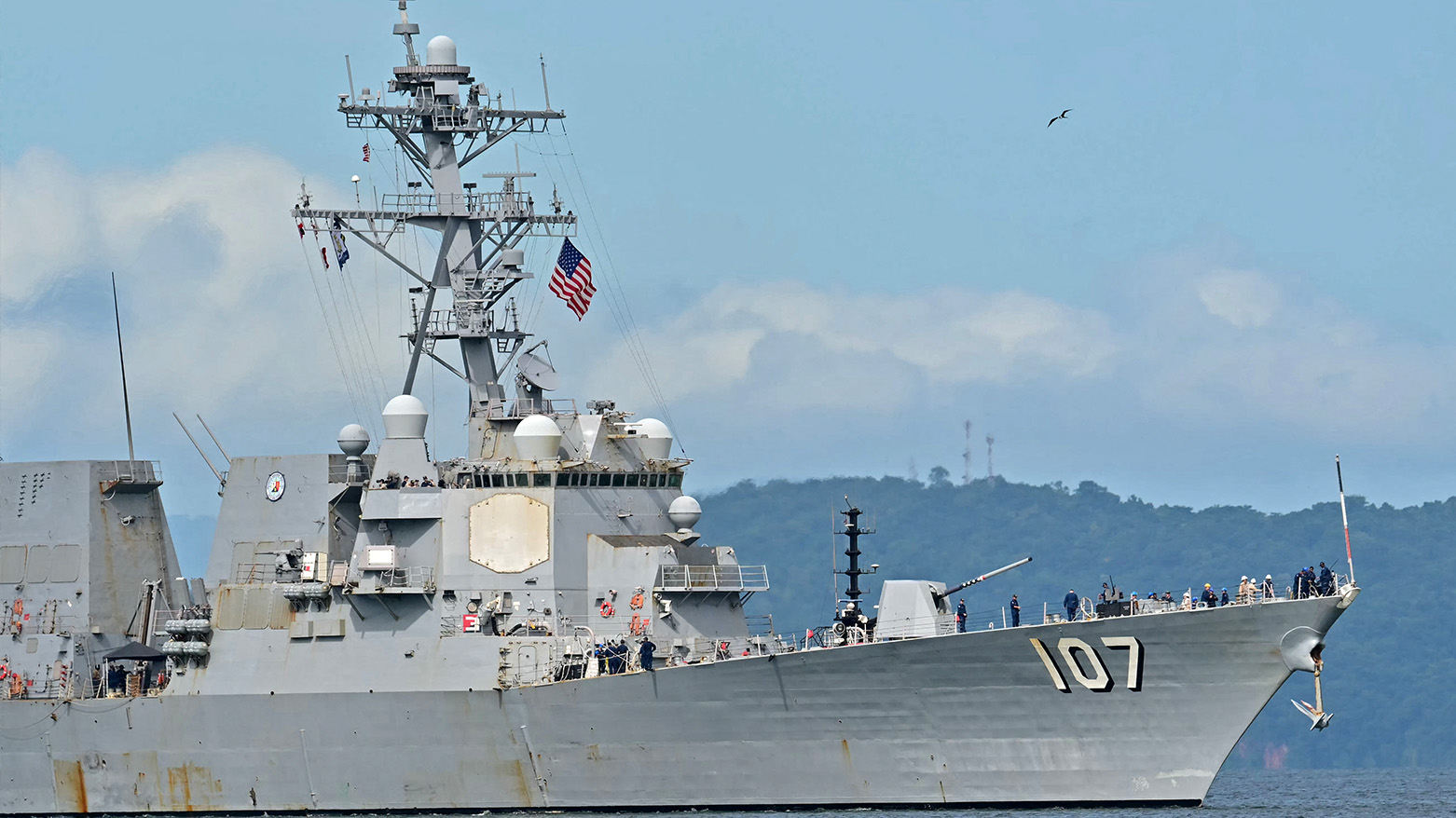U.S. Warship Docks in Trinidad and Tobago Near Venezuela Amid Rising Tensions
The USS Gravely docked in Trinidad and Tobago near Venezuela's coast amid rising tensions, as part of a wider US naval deployment Washington describes as counter-narcotics operations. Venezuelan President Maduro accused the US of "fabricating a war" in response to the military buildup.

ERBIL (Kurdistan24) – A U.S. guided-missile destroyer, the USS Gravely, docked in Trinidad and Tobago on Sunday, roughly ten kilometers off the Venezuelan coast, amid growing military and political tensions between Washington and Caracas, according to Agence France-Presse (AFP) correspondents.
The vessel was seen anchored off the shores of Port of Spain, the twin-island nation’s capital, marking a high-profile show of American military presence in the Caribbean, a region already on alert following an extensive U.S. naval buildup.
Trinidad and Tobago’s government had announced earlier that the warship and a U.S. Marine contingent were expected to arrive between October 26 and 30 to conduct joint military exercises with the local defense forces.
The country’s westernmost point lies just a few dozen kilometers from Venezuela’s coast—placing the U.S. vessel strikingly close to Venezuelan territorial waters.
The deployment is part of a wider U.S. naval and air campaign launched across the Caribbean and Gulf of Mexico, officially described by Washington as an operation to combat drug trafficking networks.
According to the Pentagon, seven warships have been dispatched to the Caribbean and one to the Gulf of Mexico as part of this ongoing campaign. The United States says it has carried out ten strikes in recent weeks against alleged drug-smuggling vessels, resulting in the deaths of at least 43 people, including civilians and fishermen, according to AFP’s tally based on U.S. data.
The White House insists the campaign is a “war on narco-terrorists,” but the strikes and escalating military activity have sparked growing fears of confrontation in Latin America.
Venezuelan President Nicolás Maduro responded sharply to Washington’s latest military moves, accusing the United States of “fabricating a war” to justify intervention and control Venezuela’s vast oil reserves.
“They are fabricating a new eternal war. They promised they would never again get involved in a war—and they are fabricating a war that we are going to prevent,” Maduro said in remarks broadcast on state television.
Just a day earlier, Maduro had implored Washington to avoid a “crazy war,” warning that the intensifying buildup risked destabilizing the entire Caribbean basin. “Yes peace, peace forever. No crazy war, please,” he said in English during a televised address to labor unions.
Maduro’s comments came amid an unprecedented American deployment, which includes more than 10,000 troops, eight warships, a submarine, and advanced aircraft, such as stealth jets and surveillance drones.
On Thursday, U.S. B-1 supersonic bombers were seen flying near Venezuelan territory—an unmistakable signal of American military intent, according to defense analysts.
The arrival of the USS Gravely in Trinidad and Tobago—a country whose Prime Minister, Kamla Persad-Bissessar, is known for her strong support for President Donald Trump—adds another dimension to the unfolding crisis. Since assuming office in May, Persad-Bissessar has adopted a hardline stance against Venezuelan migrants, framing them as a source of crime and instability in her country.
In Caracas, Venezuela’s Defense Minister Vladimir Padrino personally oversaw coastal defense drills, warning that the armed forces would “respond decisively to any foreign incursion.” He also accused the CIA of operating covertly inside Venezuela, vowing that “any attempt will fail.”
Meanwhile, analysts warn that what began as a counter-narcotics mission has evolved into a geopolitical confrontation—one that risks spiraling into direct conflict.
While the U.S. maintains that its objective is the disruption of drug-trafficking routes, regional governments and observers increasingly see the campaign as a cover for political and military escalation aimed at regime change in Caracas.
For now, both Washington and Caracas have refrained from direct engagement, but the proximity of U.S. naval forces to Venezuelan waters and the inflammatory rhetoric from both sides suggest that the region may be edging toward its most dangerous standoff in years.